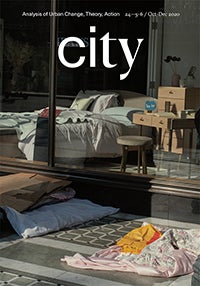Journals

City: Analysis of Urban Change, Theory, Action – Special Feature: Migrants in Global Cities in East Asia and the Gulf (Vol. 24, Issue 5-6)
| Author | : | BAAS Michiel, PAGÈS-EL KAROUI Delphine & YEOH Brenda S. A. (Guest Eds) |
| Publication Date | : | Nov / 2020 |
| Publisher | : | Taylor & Francis |
This Special Feature reflects on how cosmopolitanism is inscribed and refracted in non-western cities with global city ambitions. We focus on Asia and the Gulf to provide a counter-reading of cosmopolitanism from various cities with both unstated or explicit non-integration policies, ranging from metropoles where migrants and foreigners correspond to a small minority (such as Tokyo and Seoul), to globalizing cities where migrants constitute a substantial minority (such as Singapore) or to cities where they constitute a large majority (such as Dubai, Abu Dhabi, and Doha). The papers explore how cosmopolitanism works in situations strongly marked by racial, ethnic, social, and gender hierarchies, in cities characterized variously between the two extreme poles of ‘mixing’ and ‘segregation’, and reflecting on different ways of managing diversity. They examine how categories of difference are constructed, not only by the state (cosmopolitanism from above), but also by migrants themselves (cosmopolitanism from below). The papers examine how different categories of ‘migrants’—from highly skilled professionals to low-skilled, and middle-class migrants, and from students to ‘second generations’—strive to be part of the city while negotiating opportunities and constraints emanating from the envisioned cosmopolitanism of the global city. Taking the perspective that cosmopolitan urbanism goes beyond notions of a ‘melting pot’, métissage, or integration, we instead focus on the politics of inclusion and exclusion that shape the juxtapositions and encounters between different social groups. In this spirit, this Special Feature revisits cosmopolitanism through non-western cities to reconceptualize cosmopolitan urbanism outside the prevailing western paradigm of integration.
From ARI Workshop on “Migrants in Global Cities: Experiences from Asia, the Middle East and Europe”, 30-31 October 2017.

